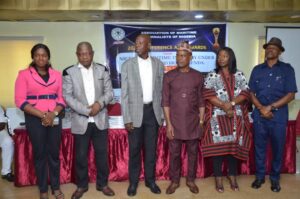In spite of contributing 1.5 percent to Nigeria’s Gross Domestic Product (GDP) with a projection to double its contribution to over 3 percent by 2035, the Nigerian Ports Authority (NPA) has disclosed that its operations have been hampered by infrastructure deficits, inadequate funding and security concerns.
Managing Director of NPA, Dr. Abubakar Dantsoho, who was represented by the Port Manager, Apapa Port Complex, Debo Lawal Abubakar, stated this yesterday at the Association of Maritime Journalist of Nigeria’s (AMJON) 2024 Conference and Awards in Lagos, stressing that despite the challenges, the authority remains committed to driving the nation’s Blue Economy forward by ensuring efficient, sustainable and innovative port operations.
Speaking at the conference with the theme: Nigeria’s Maritime Industry Under the Renewed Hope Agenda: What is New?, he canvassed robust collaboration of all stakeholders to fully harness the full potential of Nigeria’s maritime sector under the President Bola Ahmed Tinubu’s Renewed Hope Agenda with a view to fostering economic growth, jobs creation and national development.

Speaking on Nigeria Blue Economy and Ports Infrastructural Development: The NPA Perspective, he maintained that the authority has been challenged by infrastructure deficits, inadequate funding and security concerns, including piracy and stowaway issues.
He stated that the challenges could be resolved through accelerated infrastructural investments, strengthened maritime security through partnerships with global organizations, as well as policy reforms to attract foreign and domestic investors
On trade growth, he projected the possibility of a 30 percent increase in trade volume by 2030 due to improved port infrastructure, which he said, would create jobs, as the maritime sector is expected to generate over 1 million jobs by 2028.
“The sector is expected to double its contribution to GDP from 1.5 percent to 3 percent by 2035 through increased budgetary support for port projects, leveraging private sector expertise and funding, collaborations with development banks and agencies and strategic reinvestment of generated revenue into ports infrastructure and services.
Read Also: NEMA urges Enugu residents to stay vigilant against fire outbreaks
“Nigeria’s Blue economy offers numerous investment opportunities in the areas of development of inland waterways for enhanced connectivity, expansion of port infrastructure to handle increasing trade volumes, investments in maritime technology and logistics solutions, fisheries and aquaculture projects with export potential.
“The government has created an enabling environment for investments through policy reforms, incentives, and collaborations with international organizations. NPA aligns with the Renewed Hope Agenda through port Infrastructure development, modernization of port facilities and upgrading existing ports to meet international standards and expansion projects at Apapa, Tin Can Island, Onne and Warri ports to handle larger vessels,” he stated.
In his address, outgoing President of AMJON, Paul Ogbuokiri pointed out that as the watchdogs of the Nigerian maritime industry it was expected that with creation of the Ministry of Marine and Blue Economy and the appointment of a Minister the industry should be on the fast lane as regards to repositioning the sector to realize its potential.
“Our expectation is that the industry should open up to attract local and foreign investments. This high expectation is hinged on the industry’s huge potentials, which have remained largely untapped because of low investment and seeming misplacement of priority by the government in the past years.
“It is against this backdrop that AMJON is calling for a rapid improvement in the ease of doing business in our ports, this is as we wish to commend the government for the sustained zero piracy in our maritime domain. We also commend the NPA and the Lagos State Government for endING the traffic congestion on the Lagos ports access roads.
“This is as we encourage the Managing Director of NPA to speedily execute his plan to modernize the Nigerian ports to raise cargo throughput, and by extension, position the Nigerian ports to realize its potential as the hub maritime activities in West and Central Africa,” he said.






